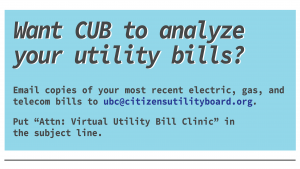 The Citizens Utility Board has announced free services for Illinois utility customers during the public health crisis and shared tips on how consumers can protect their bottom line in these uncertain times.
The Citizens Utility Board has announced free services for Illinois utility customers during the public health crisis and shared tips on how consumers can protect their bottom line in these uncertain times.
“In the middle of this unprecedented public health and economic crisis, the last thing anyone needs to worry about is high utility bills,” CUB Executive Director David Kolata said. “The CUB team is working from home, but we’re still serving consumers throughout this emergency.”
Kolata offered these consumer tips, and encouraged Illinois consumers to visit CUBHelpCenter.com to get more utility-related information about the COVID-19 emergency:
Reach out. Call CUB, at 1-800-669-5556, if you have a question or complaint about your utility service. CUB also will hold virtual events on utility and clean energy topics for Illinois community groups that request it.
Know your utility’s policy. The Illinois Commerce Commission (ICC) has directed electric, natural gas and water utilities to suspend shut-offs and late-payment charges during the emergency. Many telecom companies are offering similar consumer protections. Check out CUB’s fact sheet, or call the companies yourself to make sure your account is in good standing and to find out what protections they are offering.
Get your bills reviewed. Send us your electric, natural gas and telecom bills. A CUB specialist will look them over to see if you’re signed up with an alternative supplier or if you’re paying for unnecessary products and services. CUB also will tell you if you’re eligible for money-saving programs, including financial assistance and energy efficiency programs. Email a copy of your most recent electric, natural gas, and telecom bills to CUB at [email protected]. (Put “Attn: Virtual Utility Bill Clinic” in the subject line.) Feel free to redact your personal information, but be sure to include the account holder’s name.
Practice Energy Efficiency. At times like this, it’s more important than ever to keep your bills reasonable.
- Unplug unnecessary devices. Items like your coffee pot with an LED clock, your phone charger, a DVD player are constantly drawing power and can account for as much as 10 percent of household energy use.
- Take advantage of your windows. Don’t waste electricity on extra lighting when you could just open the curtains. Choose the brightest room in your apartment or house to work.
- Use your technology’s built-in energy savings features. Some devices have sleep mode, low-battery mode, or idle mode that can reduce energy consumption.
- Lower the temperature on your water heater to the warm setting (120 degrees).
- Cook efficiently. Use properly sized cookware for burners and the most energy-efficient appliances you have (such as a microwave). Remember, microwaves work more efficiently when the inside is clean.
- Switch to cold cycles. When doing laundry, only run full loads. Use cold water. Skip the dryer entirely and air-dry if possible.
Beware of scams. There are a lot of fraudsters trying to use this crisis to steal our money and personal information. Just this week, Illinois Attorney General Kwame Raoul warned residents to exercise caution with phone, text and email solicitations for money or personal information that are tied to the COVID-19 pandemic.
- Watch out for emails claiming to be from healthcare organizations like the Centers for Disease Control and Prevention (CDC) or World Health Organization (WHO). Don’t open attachments or click links, because that could be a scheme to infect your device with malware and leave you vulnerable to identity theft.
- Remember, government agencies won’t send emails asking for personal information for you to receive economic stimulus funds.
- Delete text messages from unknown sources that appear to hyperlink to information about the pandemic. This may be a trick to install malware on your mobile device. s
- Hang up on robocalls. Telecom scams are peddling phony COVID-19 cures, bogus testing kits and work-from-home schemes. Don’t engage, even if the recording instructs you to press a number to be removed from the call list. That might just signal to the robocaller that a live person has the number—and it may lead to more calls.
To report scams connected to the COVID-19 outbreak visit the Illinois Attorney General’s website. If you want accurate information about COVID-19, visit the Centers for Disease Control and Prevention website.

